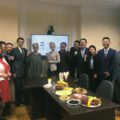The UNESCO Chair of the Institute of Asian and African Studies is a subdivision of the Moscow University and a component of the international network of UNESCO Chairs. Several blocks of study courses are taught there, including the additional experimental module on Sustainable Development Goals.
In the Institute of Asian and African Studies, Lomonosov Moscow State University (IAAS MSU), since 2016, there has been working the UNESCO Chair on Asian and African studies: Modern methods of studying and teaching. The organizer and the head of the Chair has been Deputy Director of the Institute Dilyara Solodovnik.
The chair has in its sights to unite the study of the Afro-Asian world seamlessly with the development of the dialogue of civilizations. The stress is made on the dialogue between Russia and the Orient to strengthen Russia’s positive image abroad. In the 21st century, it is a crucial task given the deteriorating geopolitical situation and the Turn to the East strategy declared by Russia’s leadership in 2013.
The UNESCO Chair of the IAAS is the only graduate chair among the UNESCO Chairs at the MSU. It provides for the educational program The Orient and Russia (Comparative Studies) is designed for foreign students and envisages a two-year master’s degree course.
The UNESCO Chair is one of the interdisciplinary chairs of the institute. This is reflected in the name of its educational program, in the topics of MA dissertations, and the cooperation with external organizations. Among them are UNESCO network chairs both in Russia and abroad, the Commission of the Russian Federation for UNESCO,
Russian higher educational institutions and institutes of the Russian Academy of Sciences, the UNESCO Secretariat in Paris, and other structures.
By now, the UNESCO Chair has carried into effect three graduations of students with a master’s degree. Among the members of the chair’s State Examination Board are Chairman of the Coordination Committee of UNESCO Chairs of the Russian Federation, Professor Vladimir Yegorov (chairman), Director of the Information and Press Department and the Spokeswoman of the Ministry of International Affairs of the Russian Federation Maria Zakharova, Head of the Center of Southeast Asia, Australia, and Oceania at the Institute of Oriental Studies, Russian Academy of Sciences Dmitriy Mosyakov, Prorector of the Higher School of Economics Aleksey Koshel, and Executive Vice President of the Systema shareholder financial corporation Mikhail Margelov.
The teachers of the UNESCO Chair have developed and have been giving a number of courses that can be grouped into four blocks:
1) Russian studies (Russia and the Civilizational Problems of the 21st Century, Main Stages of Russia’s Historical Development, etc.)
2) Civilizational studies (National Relations and Religious Dialogue, etc.)
3) International disciplines (Russia and International Political and Economic Organizations, Russia in Contemporary Geopolitics, etc.)
4) Comparative studies (the Comparative Analysis of Long-term Development of the West, East, and the Russian Federation, the Constitutional Law of Russia and Asian and African Countries, etc.)
The four blocks of courses aim to give MA students an adequate understanding of the contemporary world and its threats. To survive in this world, we need the cooperation of peoples and states to preserve their sovereignty and cultural identity. The key to such cooperation is the comparative analysis of countries and civilizations.
A prominent position in the MA students’ curriculum is occupied by the additional experimental training module Sustainable Development Goals. It aims to acquaint students with the structure and the tasks of the UNO and UNESCO as well as with the Sustainable Development Goals (SDG) adopted by the General Assembly in 2015, the modes of their achievement, and the obstacles on the way.
The acquaintance with the problems of the SDG is indispensable for the making of competent Orientalists and Africanists. The solution of all global problems somehow or other comes up against the achievement of these goals. (On the condition that the declarations on the SDG are not used as a cover on the way to some different goals.) The problems of the SDG pertain to entirely various spheres of knowledge on the world, be it political science, energetics, sociology, etc. Among the seventeen SDG adopted by the General Assembly, the UNESCO Chair of the IAAS due to its humanitarian orientation pays special attention to goals 4 (Quality Education) and 17 (Partnerships for the Goals).
Being one of the twenty chairs comprising the Coordination Committee of the UNESCO Chairs of the Russian Federation, the UNESCO Chair of the IAAS takes part in the work on the UNESCO Draft Medium-Term Strategy for 2022–2029. A prominent position in this strategy is occupied by the topics of the transition to the multipolar world and the tendencies of development in the sphere of human rights and state sovereignty.
The additional experimental module Sustainable Development Goals contributes to the solution of the tasks set by the Program of the Development of the Moscow University in the Sphere of the Internationalization and the Development of International Relations. The contribution consists in the introduction of the idea of civilizational dialogue as the basis of human survival given the crisis of the world political and economic system.
Dilyara Solodovnik, Kirill Fursov, Vyacheslav Parkhimovich,
UNESCO Chair on Asian and African studies: Modern methods of studying and teaching



